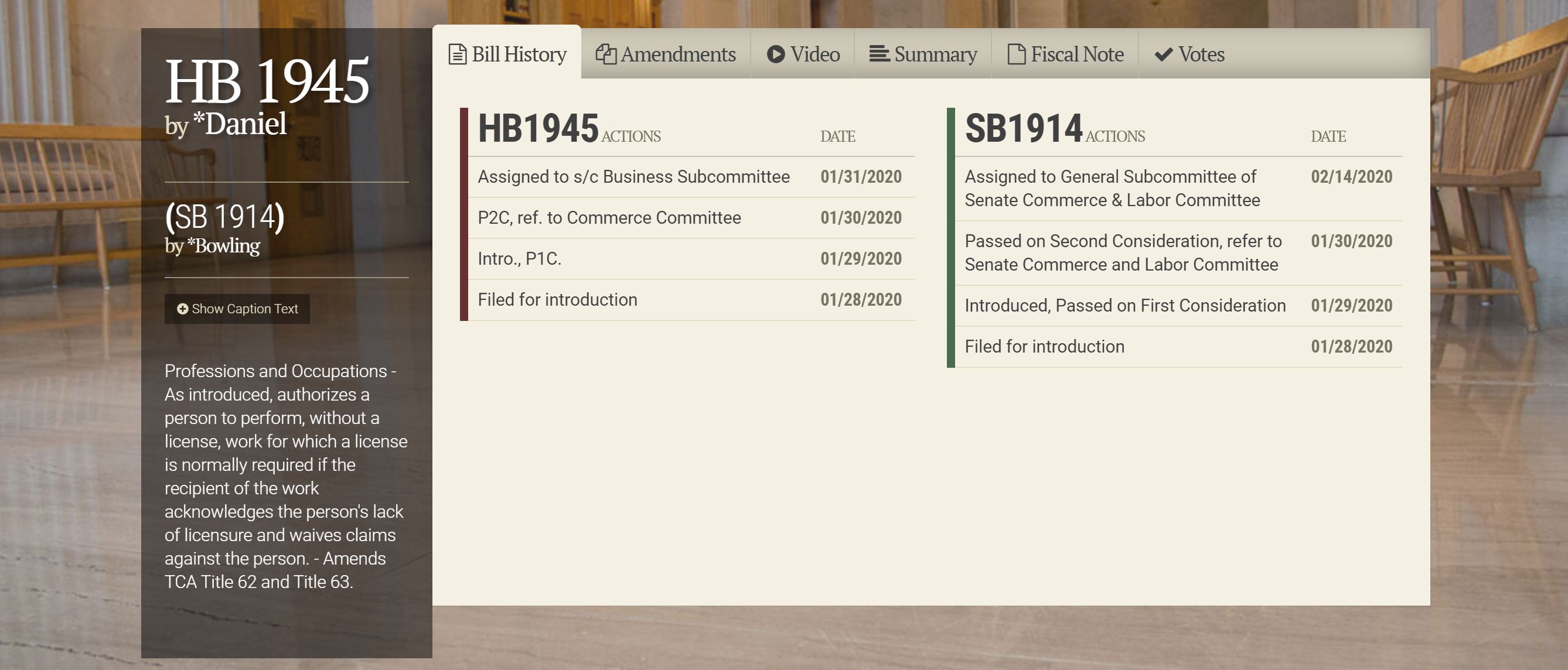Tennessee Considers Removing Licensing Requirements for Funeral Directors and Embalmers
Two Tennessee legislators have introduced a bill that would remove licensing requirements for people in 27 occupations, including funeral directors and embalmers. Tennessee Representative Martin Daniel and Senator Janice Bowling filed House Bill 1945 and Senate Bill 1914 on January 28. As of February 14, each had been assigned to subcommittees for consideration.
Affected occupations
If the proposal passes, people engaged in the following occupations could perform their work without a license, registration, or certification:
- Accountants;
- Architects, engineers, landscape architects, and interior designers;
- Barbers;
- Cosmetologists;
- Funeral directors and embalmers;
- Contractors;
- Home inspectors;
- Plumbers;
- Home improvement contractors;
- Locksmiths;
- Real estate brokers;
- Land surveyors;
- Soil scientists;
- Auctioneers;
- Individuals engaged in the application of pesticides;
- Rental location agents;
- Private investigators;
- Polygraph examiners;
- Individuals engaged with fire protection sprinkler systems;
- Servicers of fire extinguishers and related equipment;
- Alarm contractors;
- Private protective services;
- Geologists;
- Tattoo artists;
- Body piercing artist;
- Real estate appraisers; and
- Professional employer organizations.
The bill requires that customers sign a written agreement that they’re aware the worker is not licensed, registered, or certified in their craft or profession. The agreement also releases the worker from all liability. The only exception is for actions for intentional, willful, or malicious conduct. Additionally, anyone injured from the work who wasn’t privy to the agreement is authorized to bring legal action.

The state of regulations
Currently, funeral directors, embalmers, and funeral establishments in Tennessee are regulated by the Board of Funeral Directors and Embalmers. The board’s requirements for obtaining a new or initial funeral director or embalmer license include:
- Two letters of recommendation by a licensed funeral director and/or embalmer attesting to the good moral character and competence of the applicant,
- High school graduation or GED
- Completion of completion of study in funeral service education (for funeral director applicants)
- Associate of arts degree by successful completion of a mortuary science program (for embalmers)
- Where applicable, successful scores on the national board licensing examination
- Certification of completion of one or two years of apprenticeship
Tennessee’s requirements are similar to those of most states. At least one state — Hawaii — has no licensing requirements for funeral directors at this time. Hawaii’s death care industry made news last fall for its lax regulatory requirements. In fact, one publication referred to a “deluge of incidents” in Hawaii in calling for greater oversight.
“We must look at the law as the foundation of decision-making, and hence ethics as ideology and virtue which supersedes this foundation,” wrote K. Kanani Souza in the Honolulu Civil Beat. “The legal bottom-line is referred to as the ‘moral minimum.’ Ethical decision-making, especially in such a sensitive industry, is imperative to reach end results that positively affect society as a whole.”
A case of “buyer beware?”
One Reddit subscriber commented in response to the deregulation of professions, “They can still get credentials. This is removing the requirement. Let the consumer choose.”
Perhaps this Redditer is right. Just because the state of Tennessee will no longer enforce these minimum standards doesn’t mean that individual employers won’t. Funeral home owners can still stick by the existing requirements or something similar in their hiring practices.
Of course, financially strapped employers might find less-educated, non-licensed directors and embalmers a cheaper alternative. They might find that bypassing a lengthy licensing process gives them quicker access to staff. There would be nothing in the new law to keep them from hiring their nephew and providing on-the-job training.
Consumers might be none-the-wiser. The death care profession relies heavily on its reputation for integrity and professionalism. Clients and families trust that their funeral director knows what he or she is doing. They’re not likely to check the licenses and certifications of everyone on staff. And they’ll probably never know if the embalmer has followed recommended procedures in preserving the body of their loved one.
One question: Why?
Funeral directors and embalmers aren’t the only occupation on the list for de-regulation that are cause for alarm. Unlicensed, unregulated, or non-certified accountants, home improvement contractors, engineers, and fire protection providers can leave serious, if unintentional, consequences in their wake.
We couldn’t find any justification for this proposal, and it does make one wonder what prompted these lawmakers to think up such a thing. Connecting Directors will keep you informed on the bill’s progress, though. Your comments and opinions are most welcome.




